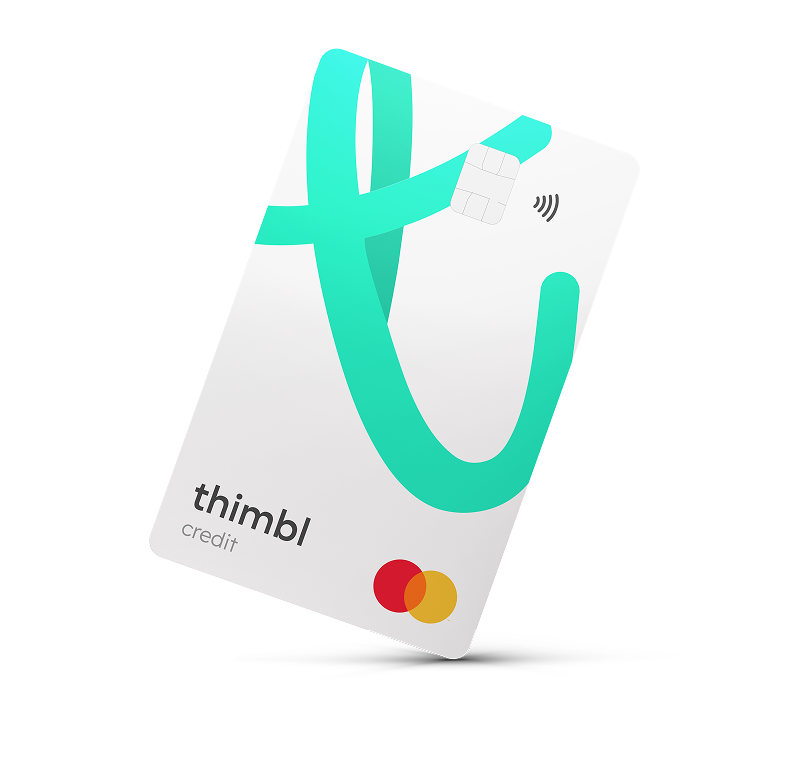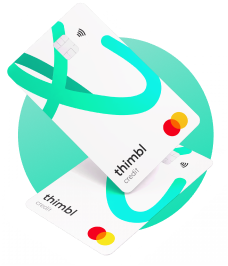No Credit Check Credit Cards
Credit Cards With No Credit Check
Check if you're eligible with no impact to your credit score - For all credit levels, from poor to excellent. Start your journey toward a healthier credit position




Are you thinking about searching for a credit card?
Are you worried that your low credit score might stand in your way of approval?
If so, it’s understandable that you might have wondered whether you can get a credit card with no credit check.
The thimbl guide to no credit check credit cards covers some important questions, such as:
- Can I get a credit card without a credit check?
- Do no credit check credit cards exist?
- Can you get a credit card with bad credit?
Can I get a credit card without a credit check?
You cannot get a credit card without an affordability check.
Regulations set by the Financial Conduct Authority (FCA) require all responsible lenders and credit providers to carry out affordability checks on anyone who applies for a credit product.
If you’re concerned about your credit score, the thought of undergoing a credit check might be daunting, but you should know that these checks are in place to protect you.
In the past, credit providers based their decision on your credit score. There are now other ways for providers to gain an insight into your financial history by taking other factors into consideration.
Open Banking is a safe and secure process used by some providers. With your consent, Open Banking shares your recent financial transactions with an authorised third-party, such as a provider, without harming your credit score. Open Banking provides a read-only view of your account and you can withdraw your consent at any time.
- For all credit levels, from poor to excellent
- Checking won’t affect your credit rating
- 48.9% APR Representative (variable)

Do no credit check credit cards exist?
Warning: no credit check credit cards
Any companies claiming to offer no credit check credit cards should be avoided, as this is not operating in-line with FCA guidelines. Sharing your information with unregulated companies could put you and your money at serious risk.
All authorised and regulated companies will appear on the FCA register, which you can view here.
What's a hard search?
A hard search enables providers to gain an in-depth understanding of your credit history. It will reveal how well you’ve managed credit in the past; will give providers an idea of your creditworthiness; and be an influencing factor in their decision whether to lend you money.
A hard search will remain visible on your credit file for up to 12 months and undergoing multiple hard searches within a short period of time could damage your credit score.
What's a soft search?
A soft search is often carried out by credit brokers and allows them to view your credit history without leaving a mark on your credit file.
A soft search will not impact your credit score.
Can I get a credit card with bad credit?
It might be possible for you to get a credit card, even if your credit score is looking a little worse for wear. Before you apply for a bad credit credit card, you should bear in mind that you might be presented with a higher rate of interest and your credit starting limit could be more manageable.
Some credit cards, such as credit builder credit cards, are designed for people with low credit history or no credit history at all.
It’s important to be aware of exactly how credit cards work and how having one will affect your credit score.
If you’re approved for a credit card, you’ll need to make a monthly repayment until your balance is clear. The amount due will usually be a percentage of your outstanding balance. This will include any interest.
Repaying your balance in full and on time each month will mean that you won’t be charged any interest.
How will a credit card affect my credit score?
All credit products, whether that’s a loan, mortgage, or credit card, will affect your credit score.
How you manage your credit card will be reflected in your credit score. For example, if you make a late repayment or miss one altogether, your credit score will suffer as a result.
On the other hand, making at least the minimum repayment amount each month and staying well within your credit limit could have a positive effect on your credit score. Your credit limit is the total amount of money that you’re able to borrow.
What causes bad credit?
Bad credit can be caused by several reasons, including poor credit management; missing payments on your bills; moving house regularly; undergoing multiple hard searches in a short space of time; and even being the victim of financial fraud.
Can bad credit be fixed?
Yes. The good news is that bad credit doesn’t need to be forever.
Whether your credit score is terrible or average, there are steps you can take to work towards a healthier credit position, starting today.
Ways to improve your credit score
- Pay your bills on time. This includes your household commitments, such as gas, electricity, and water, as well as additional expenses like your phone bill. Late or missed payments could cause a decline in your credit score.
- Have you registered to vote? Being on the electoral roll could make it easier for potential providers or lenders to verify you and your information, including your current address. In turn, this could have a positive influence on your credit score.
- How often do you check your credit report? Try to make a habit of giving it a once-over every few weeks to ensure all the information provided about you is accurate and up to date. You can report any inaccuracies to the credit reference agency (CRA).
- Be aware of the impact of a joint account. It’s understandable that this isn’t always possible, although you should be aware that sharing a joint account with somebody who has poor credit could have a negative effect on your own score.
- If you’ve already got a credit card, there are a number of things you can do to help protect your credit score. Using your credit card to withdraw money from a cash machine is known as a ‘cash advance’ and could signal poor money management. Additionally, you should stay well within your credit limit and aim to keep your credit card utilisation as low as possible.
Jargon Buster: your credit card utilisation is the amount of money you’ve borrowed compared to your credit limit. Let’s say your credit limit is £2,000 and you’ve used £400 of this. Your credit card utilisation would be 20%.
If you’re hoping to improve your credit score, the lower your credit card utilisation, the better.
Credit builder credit cards
If you’re searching for a credit card for bad credit, you might have asked, ‘which credit cards are the easiest to get?’.
No credit cards can be considered ‘easy’ to get; as previously discussed, responsible providers will carry out thorough affordability checks, which will include a hard search or Open Banking.
People with poor credit history or a thin credit file may wish to do some research into credit builder credit cards.
This type of credit card could be a suitable option for people hoping to establish and build their credit score as they come with a low credit limit to help with responsible spending.
Here's how they work
1. Use your credit builder credit card to make small, manageable purchases. Remember to never use your credit card to spend more money than you need to or can afford to repay.
2. Make at least the minimum repayment due on your credit builder credit card account each month. If you can, you should try to repay more than the minimum amount. If you clear the balance in full and on time each month, you won’t be charged any interest.
3. Credit builder credit cards could be most effective when used alongside other credit-building methods, as listed above.
4. Your repayment habits will be reported back to the credit reference agencies (CRAs) and, in time, you could see an improvement in your credit score.
Who could get a thimbl Credit Builder Credit Card?
You can check your eligibility for a thimbl Credit Builder Credit Card if you:
- Are over the age of 18;
- Are a UK resident;
- Have a UK bank account and valid debit card; and
- Have a regular source of income paid into your bank account.
Before you apply
A credit card is a serious financial commitment, and you should take the time to weigh up your options and do thorough research beforehand.
Spending money on a credit card is a type of debt, so you must be certain that you’re able to make at least the minimum repayment amount each month.
Falling behind on, or failing to make your repayments, could cause serious money problems, and may result in additional fees and charges, financial stress, and damage to your credit score.
Worried about money?
Please know that you can access free, confidential money and debt management advice through charities and organisations such as StepChange, MoneyHelper, Citizens Advice, and National Debtline.
If you’re struggling to make the monthly repayments on your credit card, you should contact your provider as soon as you can.

Page last reviewed: 13th January 2025
Page reviewed by: Alex Kosuth-Phillips
You get all this with thimbl
Tap and go
Quick and easy contactless payments up to £100.
Secure banking app
Manage your credit card online, wherever and whenever you like, with the free mobile app.
A trusted service
Over 4,500 positive reviews from our customers.
48.9% APR Representative (variable)
Quick links








Worried about money?
If you're worried about the cost of living, need support with budgeting, or think you might need debt advice, StepChange could help. They offer free and impartial support and help hundreds of thousands of people every year to deal with their debts and take control of their finances.
To find out how StepChange could help you, take the free Money Health Check. It's quick and easy to complete, and will give you a personalised recommendation on what to do next.
Meet the team
Head of Compliance
Head of Partnerships
Managing Director, thimbl
Marketing Manager, thimbl
Financial Content Writer
Frequently asked
questions
If you've got a question, you may just find the answer you're looking for here. If not, please visit our contact us page and get in touch.
What will my credit limit be?
You will always be made aware of any credit limit changes to any credit cards you have beforehand, and you do not have to accept a credit limit increase if you don't feel it's right for you.
What happens if I fail to make my repayments?
Missed payments will be reported to the credit bureaus, and your account will appear as in arrears. You will be charged a late fee, which is usually around £12. Your credit rating is also likely to decline as a result.
You should try to make your missed payments as soon as possible.
If you're struggling to keep on top of your repayments, you can find free, impartial advice from MoneyHelper, StepChange, Citizens Advice and National Debtline
If you want to know more about how credit cards work, you can read our blog.
Did you find this article helpful?
Let us know how we can be more helpful
Please leave your anonymous feedback to help us keep improving.
Need help or support?
Whether it's a question or you just need support, we're here to help.







